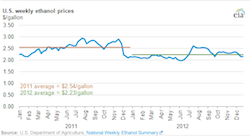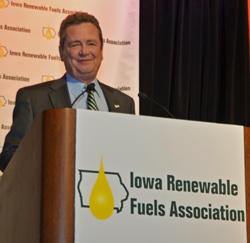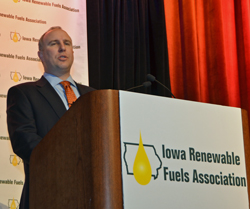The Environmental Protection Agency (EPA) has released it proposed rules today for the 2013 Renewable Fuel Standard (RFS) volumetric requirements. Public comment is open until March 19, 2013. The proposal waives the cellulosic biofuel requirement from one billion gallons to 14 million gallons, but retains overall advanced and renewable fuel requirements.
 The ethanol industry responded today with statements and Bob Dinneen, the president and CEO of the Renewable Fuels Association said, “The 2013 RFS requirements will be the catalyst that finally compels oil companies to get serious about breaching the so-called blend wall. This year’s RFS requirements will necessitate the use of more E15, E85 and other higher-level blends. Injecting larger volumes of biofuels into the U.S. fuel supply and spurring a more rapid transition to domestically produced renewables is exactly what the RFS was intended to do. The program is working as envisioned by Congress.”
The ethanol industry responded today with statements and Bob Dinneen, the president and CEO of the Renewable Fuels Association said, “The 2013 RFS requirements will be the catalyst that finally compels oil companies to get serious about breaching the so-called blend wall. This year’s RFS requirements will necessitate the use of more E15, E85 and other higher-level blends. Injecting larger volumes of biofuels into the U.S. fuel supply and spurring a more rapid transition to domestically produced renewables is exactly what the RFS was intended to do. The program is working as envisioned by Congress.”
 Brian Jennings, Executive Vice President of the American Coalition for Ethanol (ACE) noted that his organization is concerned, as our other ethanol organizations, about the way the advanced biofuel pool serves as a magnet for imports of Brazilian ethanol. “We appreciate EPA providing us the opportunity to elaborate on this concern and look forward to continuing the dialogue on how to ensure Brazilian imports don’t displace domestic ethanol. The RFS is a catalyst for technology innovation and we believe 2013 will deliver key breakthroughs for U.S. grain sorghum based advanced biofuel and cellulosic biofuel. We look forward to providing additional comments during the 45 day comment period,” said Jennings.
Brian Jennings, Executive Vice President of the American Coalition for Ethanol (ACE) noted that his organization is concerned, as our other ethanol organizations, about the way the advanced biofuel pool serves as a magnet for imports of Brazilian ethanol. “We appreciate EPA providing us the opportunity to elaborate on this concern and look forward to continuing the dialogue on how to ensure Brazilian imports don’t displace domestic ethanol. The RFS is a catalyst for technology innovation and we believe 2013 will deliver key breakthroughs for U.S. grain sorghum based advanced biofuel and cellulosic biofuel. We look forward to providing additional comments during the 45 day comment period,” said Jennings.
 Growth Energy CEO Tom Buis said there are a number of issues that should be considered, which could have serious impacts on the U.S. production of biofuels. “The RFS has been a resounding success, helping create jobs in America that cannot be outsourced, revitalizing rural economies across the country in addition to reducing our dependence on foreign oil and providing consumers with a choice and savings at the pump,” he added.
Growth Energy CEO Tom Buis said there are a number of issues that should be considered, which could have serious impacts on the U.S. production of biofuels. “The RFS has been a resounding success, helping create jobs in America that cannot be outsourced, revitalizing rural economies across the country in addition to reducing our dependence on foreign oil and providing consumers with a choice and savings at the pump,” he added.
 One of the elements of the proposal waives the cellulosic biofuel requirement from one billion gallons to 14 million gallons. Brooke Coleman, executive director of the Advanced Ethanol Council said that the EPA’s is getting to right number on cellulosic biofuels and noted that the industry is just breaking through at commercial scale. ” U.S. EPA worked hard to ensure that the cellulosic biofuels volume standard for 2013 would be tied directly to the commercial production of cellulosic biofuels expected to come online this year. While weaning the United States off of its addiction to foreign oil is not easy, the volume standards proposed today will continue to provide advanced biofuel investors and innovators with a predictable and durable path forward in that effort.”
One of the elements of the proposal waives the cellulosic biofuel requirement from one billion gallons to 14 million gallons. Brooke Coleman, executive director of the Advanced Ethanol Council said that the EPA’s is getting to right number on cellulosic biofuels and noted that the industry is just breaking through at commercial scale. ” U.S. EPA worked hard to ensure that the cellulosic biofuels volume standard for 2013 would be tied directly to the commercial production of cellulosic biofuels expected to come online this year. While weaning the United States off of its addiction to foreign oil is not easy, the volume standards proposed today will continue to provide advanced biofuel investors and innovators with a predictable and durable path forward in that effort.”
In conclusion, the industry representatives said they look forward to working together to finalize the targets.











